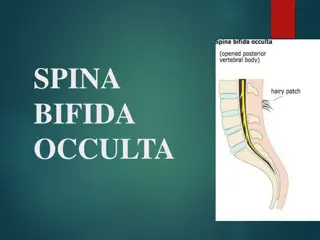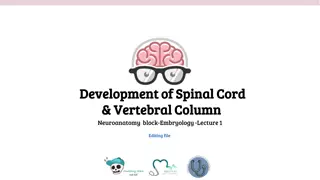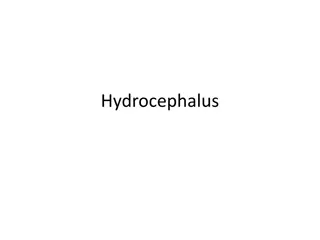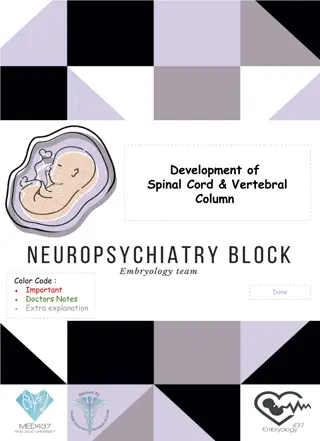Understanding Spina Bifida Occulta: Symptoms, Causes, and Treatment
Spina Bifida Occulta is a common neural tube defect, usually mild and hidden. It affects the lumbosacral area, characterized by vertebral arches not fusing, resulting in spinal processes defects without external protrusion. Common features include dimples, hairy patches, and normal spinal cord. Neur
0 views • 10 slides
Sustainable Waste Management Initiatives in Italy
The "Recycle, Reuse, and Reduce in Italy" project led by Bianchi Giulia, Bonamico Carola, Spina Chiara Maria, and Trabona Lucrezia highlights Italy's efforts to tackle waste production and pollution. Over the years, Italy has made progress in reducing annual waste and increasing recycling rates, wit
0 views • 10 slides
Embryology of Spinal Cord and Vertebral Column Development
Explore the fascinating embryological journey of the spinal cord and vertebral column development, covering topics such as neural tube formation, layers of the spinal cord, subdivisions of mantle and marginal zones, chondrification, ossification stages, spina bifida types, and more. Dive into the st
1 views • 15 slides
Understanding Birth Defects: An Overview of Congenital Anomalies
Birth defects refer to abnormalities present in babies at birth, regardless of genetic or prenatal causes. They affect 2-3% of babies in the US, making them a leading cause of infant mortality. Structural defects like cleft lip/palate, spina bifida, and club foot can impact a child's health and deve
0 views • 17 slides
Understanding Hydrocephalus: Causes, Characteristics, and Impacts
Hydrocephalus is a condition resulting from an imbalance in cerebrospinal fluid production and absorption, leading to swelling and pressure on the brain. It can occur due to various reasons like congenital factors, prematurity, spina bifida, meningitis, or brain tumors. The condition manifests diffe
0 views • 35 slides
Development of Spinal Cord and Vertebral Column - Doctors' Notes
The development of the spinal cord from the neural tube, layers of the spinal cord, subdivisions of mantle and marginal zones, meningeal layers, vertebral column development, chondrification, ossification stages, spina bifida types, and positional changes of the spinal cord are crucial aspects cover
0 views • 10 slides





